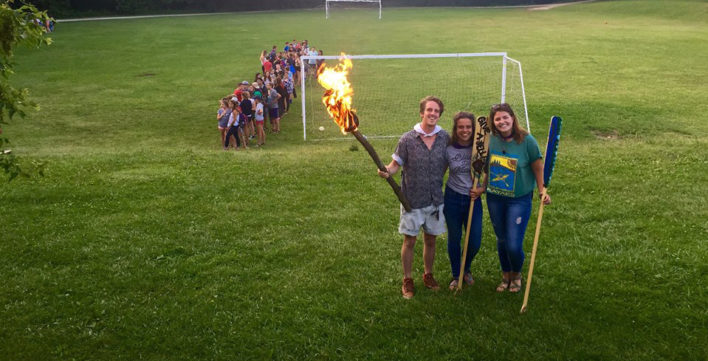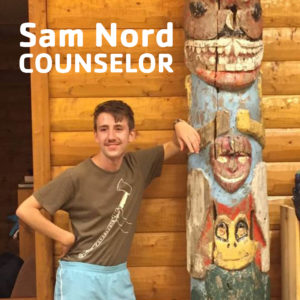
The role of the counselor in a camper-centric program
By: Rachael Shaff
YMCA Camp Minikani counselors are known for their energy, enthusiasm and ability to inspire campers’ best selves.
If you ask any counselor why they are passionate about camp, one truth rings through: When they were a camper at Minikani, a counselor inspired them to be themselves, unabashedly.
Minikani counseling staff—figuratively and sometimes quite literally—carry the torch of counseling that has been passed down by their mentors. Counselors take their responsibility of continuing this legacy seriously. With concerted effort, they create an experience that embraces campers for who they are and what they love.

We sat down with Sam “Snord” Nord, third-year counselor, to hear his perspective on counseling legacies.
Q: How would you describe your approach to counseling?
A: I’d like to think that I try my best to be a member of the cabin. You know, like not just their superior but their buddy. I think that every single camper, no matter what age or origin, is purely good at heart. Even the most difficult campers just want to have fun at camp. And I think as their counselor, it is my obligation to give them the opportunities that were given to me by my counselors. William “Wild Bill” Costello really put an impression on me when I was an LT3 [third-year leadership trainee]. He told me that every camper was like a gummy bear: They all have a soft inside no matter how hard their outside is. It’s kind of a weird analogy, but Bill’s the kind of guy to think outside the box.
Q: How has legacy shaped your approach?
A: Legacy is a huge factor when it comes to counseling. I think every counselor and LT [leadership trainee] I’ve had has shown me many different values that I try to bring to my cabins. My first counselors, JC Hauser and Michael Luckey, showed me that even though I was beyond hysterically homesick, I was able to have the time of my life at camp. They cemented into me that camp was the place that I belonged. Andy Hansen showed me that there is always room at Minikani to goof around. He also showed me that even the goofiest counselor can make a meaningful and down-to-earth experience for a bunch of young Boys Unit campers. Madison Mead showed me that even with the toughest cabin, a counselor’s dedication to their kids will make every camper’s experience better. Ben “Bendo” Edelstein showed me what it means to be a Minikani counselor. He gave me the confidence to follow my dreams to join the LT [leadership training] program with the hope of becoming a counselor. Bendo inspired me to do my best for every one of my campers. I dedicated my first summer to him because of what he instilled in me while I was his camper, two years in a row.
Q: What do you think is the most important quality of a counselor?
A: Genuineness. I think that wanting to be at camp and wanting to help campers is one of the most important qualities for a counselor. While there are boat loads of other important aspects of a counselor, their compassion and authenticity can go a long way with campers. Caring for kids is a line of work that takes real, heartfelt dedication. It’s a dedication that is is easy to find at Minikani. Every counselor cares for their campers deeply. Many of my coworkers and friends would do anything to ensure that their campers are having the best possible experience at Minikani.
Q: What are camp symbols, legends, rituals or legacies do you especially value?
A: I think that the axe, carried by the Boys Unit director during opening and closing campfire, is immensely powerful. Every BU director in camp’s history has carried the axe while leading the BU in the line that they once stood in as campers. It’s a symbol of unity that is often overlooked in the Boys Unit legacy.
Another symbol that means a lot to me on camp is the Lightning Zed. As the symbol of Cabin 10, I believe that it represents aspects of camp that I hold dear. I feel that it represents all the creative potential that exists at Minikani. For campers and staff who have stayed in cabin 10, there is something magical about that building. It has housed some of my own favorite memories of camp as a camper and as a counselor.
Q: Did something about the BU specifically speak to you when you were a camper?
A: The Boys Unit, like any unit on camp, empowered me to be me. Through all my BU counselors, I learned that living my best life means being my true self. That notion is something that every unit on camp does well, and I was lucky enough to have that experience in the BU. Throughout my academic career, I have written countless essays on the power that the Boys Unit has had on my life. Yet, I don’t think it was because of one action or one specific counselor. I believe it was a cumulative process. Every year in the BU I learned something different. My experiences were hardly ever the same. And I think that that variation, from counselor to counselor, from cabin to cabin, is what makes the Boys Unit such a powerful force.
Q: What is it like to be a mentor for LTs and continue what was provided to you?
A: Mentoring LTs is one of the coolest aspects of being a counselor. I was an OLT [outdoor leadership trainee] only just a few years ago. Learning from my directors and counselors was such a formative time in my life. I am glad to be a part of this legacy for future generations. The idea of inspiring a LT blows my mind. It is a very humbling feeling—knowing that the people I looked up to also looked up to a Minikani leader. Generations upon generations have been growing from one-another for almost 100 years at Minikani.
Q: What makes Minikani a special space for kids?
A: The Staff. Our former Summer Camp Director, Tom Cramer, once told me that the magic of camp could happen in a parking lot, as long as we had our staff. My coworkers and friends are amazing people that love and care for kids deeply. That love and compassion drives Minikani staff to succeed. Every person at Minikani wants every camper to have the best time possible. They do everything in their power to see it through. This is what gives life to the Spirit of Minikani.
Q: Now that you are a counselor, have you found that campers inspire you just as much as you inspire them?
A: My campers inspire me as much, if not more, than my counselors did when I was a camper. Through my three years of counseling, I have learned so much about myself and the world around me through campers. Counseling campers has made me totally rethink my future. Originally, when I went to university, I went to study forestry, but after my first year of counselling, I knew that education was the path for me. Children’s perspective and outlook is so impressive, and the campers at Minikani double it. They’ve inspired me loads in my life, and I hope I have done the same.
Q: When you move on from Minikani, what will stick with you most?
A: Yeesh! That’s a hard reality to face, but it will come eventually. When it does, I think the biggest thing that I’ll take away is the fun I had. The fun I had when I was a camper, exploring the outdoors for the first time; growing my love for nature; and challenging myself to make new friends and set new goals. I’ll take away the fun I had as an explorer, challenging myself to step into a semi-leadership position and growing in my own independence. I’ll take away the fun I had as an OLT; Learning through doing and stepping out of my comfort zone; pushing my limits when it came to improving my leadership abilities; making lifelong friends and memories; and growing into a young adult. I’ll take away the fun I had when I was a counselor, learning how the powers of compassion and understanding are very strong; seeing my friends and campers perform some of the dearest acts of humanity I have ever seen; and helping kids grow into the people they wish to be. I think I will take away how fun it was to be a part of Minikani.
04 Apr, 2018
Counseling
Comments
Comments are closed.



0comments